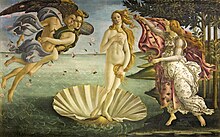You are currently logged-out. You can log-in or create an account to see more talks, save favorites, and more. more info
Renaissance Talks

The Renaissance (UK: rin-AY-sənss, US: REN-ə-sahnss) is a European period of history and cultural movement, very roughly defined as covering the 14th through 17th centuries, though sometimes more narrowly defined for instance as only covering the 15th through 16th centuries. It marked the transition from the Middle Ages to modernity and was characterized by the European rediscovery and revival of the literary, philosophical, and artistic achievements of classical antiquity. Associated with great social change in most fields and disciplines, including art, architecture, politics, literature, exploration and science, the Renaissance was first centered in the Republic of Florence, then spread to the rest of Italy and later throughout Europe. The term rinascita ('rebirth') first appeared in Lives of the Artists (c. 1550) by Giorgio Vasari, while the corresponding French word renaissance was adopted into English as the term for this period during the 1830s.
The Renaissance's intellectual basis was founded in its version of humanism, derived from the concept of Roman humanitas and the rediscovery of classical Greek philosophy, such as that of Protagoras, who said that "man is the measure of all things". Although the invention of metal movable type sped the dissemination of ideas from the later 15th century, the changes of the Renaissance were not uniform across Europe: the first traces appear in Italy as early as the late 13th century, in particular with the writings of Dante and the paintings of Giotto.
As a cultural movement, the Renaissance encompassed innovative flowering of literary Latin and an explosion of vernacular literatures, beginning with the 14th-century resurgence of learning based on classical sources, which contemporaries credited to Petrarch; the development of linear perspective and other techniques of rendering a more natural reality in painting; and gradual but widespread educational reform. It saw myriad artistic developments and contributions from such polymaths as Leonardo da Vinci and Michelangelo, who inspired the term "Renaissance man". In politics, the Renaissance contributed to the development of the customs and conventions of diplomacy, and in science to an increased reliance on observation and inductive reasoning. The period also saw revolutions in other intellectual and social scientific pursuits, as well as the introduction of modern banking and the field of accounting.
| Title | Speaker | |
|---|---|---|
Camaldolese CreativitySerial: NC-01072 Community Retreat Spring 2002 OSB Cam, Renaissance, Ambrose Traversari, Marsilio Ficino, Neoplatonism, Platonic Academy (Florence... |
Apr 2002 3 of 5 (#4 not recorded) New Camaldoli Hermitage |